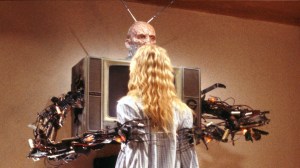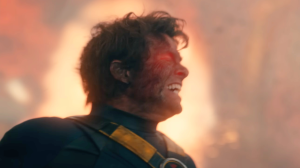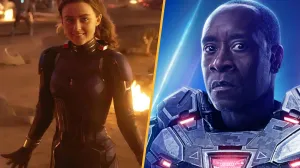When The Black Phone premiered, it shattered box office expectations with its blend of supernatural mystery and a grounded serial killer story. The film introduced audiences to Finney (Mason Thames) and Gwen (Madeleine McGraw), siblings who are pitted against a sadistic child murderer known as The Grabber (Ethan Hawke). While Finney is held captive in the killer’s soundproof basement, fighting for survival with cryptic guidance from the ghosts of past victims, Gwen is on the outside, using her psychic visions to lead a desperate search, all while battling the violent disbelief of their father, Terrence (Jeremy Davies).
Videos by ComicBook.com
With the release of The Black Phone 2, the established mythology of the first film has been drastically expanded. While the sequel is set four years after Finney’s escape, it also delves into the past, unearthing the history of Finney and Gwen’s mother and revealing the previously unknown origins of the Grabber himself. In doing so, The Black Phone 2 reframes the original movie as a pivotal chapter in a multi-generational saga of psychic abilities and unresolved spiritual torment. Understanding the full narrative now requires piecing together a timeline that jumps between three distinct periods, connecting a haunted youth camp in the 1950s, the Grabber’s reign of terror in the 1970s, and a paranormal battle in the 1980s.
Hope Adler, Alpine Lake, and the Grabber’s First Kills

The complete story of The Black Phone begins decades before Finney ever heard a ghostly ring. In the winter of 1957, Hope Adler (Anna Lore), the future mother of Finney and Gwen, is working as a training counselor at Alpine Lake, a Christian youth camp nestled in the snowy Colorado mountains. Hope begins experiencing disturbing dreams of children trapped beneath the ice of a frozen lake. In these visions, the children desperately scrape a seven-digit number onto the underside of the ice. Hope recognizes it as a local phone number and, using the camp’s public black phone, she places a call that mysteriously connects her across time to her own future daughter, Gwen. Hope doesn’t recognize Gwen, of course; she only knows the voice on the other side of the call has also been experiencing the same kind of dreams. This connection, however, establishes the powerful, cross-generational psychic link of their family.
Working alongside Hope at Alpine Lake is a man known as Wild Bill Hickok, a nickname earned from the tools he perpetually wears on his belt like a gunslinger’s weapons. This man is the future Grabber, and Alpine Lake is his first hunting ground. He murders three children from the camp: Felix (Simon Webster), Cal (Shepherd Munroe), and Spike (Chase B. Robertson). Using his access to the camp’s tools, the Grabber cuts a hole in the nearby frozen lake and sinks their bodies in barrels into the frigid water, ensuring they will never be found. These are the very children from Hope’s dreams, and because their bodies remain undiscovered, their spirits are unable to move on to the afterlife, doomed to remain stuck at Alpine Lake as they slowly forget their own identities.
The disappearances of the three children, combined with the police finding the burnt remains of one victim’s clothing, leads to Alpine Lake being shut down for good in 1958. Because the lake was frozen solid during the peak of winter, the police never bother to conduct a proper search of its depths, allowing the Grabber to escape all suspicion and continue his killing spree elsewhere. The camp’s cook, Mando (Demián Bichir), is the only one who remains on the property. He spends over a decade scouring the area for the children’s bodies before eventually saving enough money to buy Alpine Lake and reopen it, never giving up on his search.
Hope Finds the Truth About the Grabber
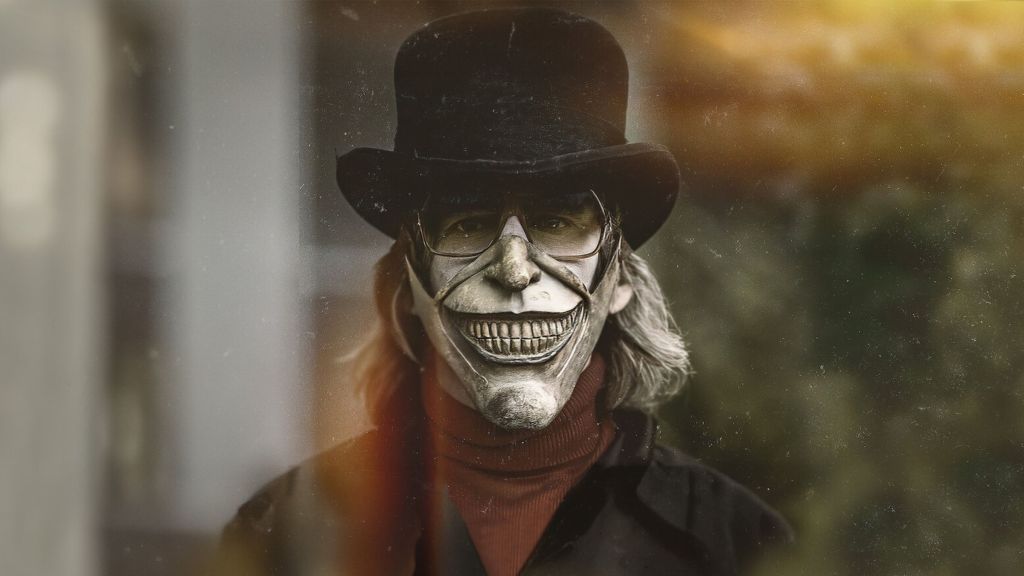
By 1977, Hope is married to Terrence and is the mother to a young Finney and Gwen. Her psychic abilities, dormant for years, resurface with terrifying intensity. She starts having horrible dreams about Billy Showwater (Jacob Moran), a local boy from their neighborhood who has recently disappeared. These prophetic visions lead her directly to the Grabber’s house in the dead of night. There, she confirms her worst fears, seeing that the boy is being held captive in the basement. Her discovery does not go unnoticed. The Grabber spots Hope spying on him, follows her back to her home, and murders her in the garage. He expertly stages the scene to look like a suicide, a narrative that the world, including her own family, tragically accepts.
Hope’s violent death becomes a foundational trauma for the family and directly explains the hostile environment seen in the first film. Terrence, shattered by the loss of his wife, descends into alcoholism. More significantly, he develops a deep-seated fear and resentment toward the psychic abilities he believes drove his wife to madness and death. This fear manifests as abusive behavior, particularly towards Gwen, as he punishes her for exhibiting the same supernatural sensitivities.
Finney’s Ordeal in the Grabber’s Basement
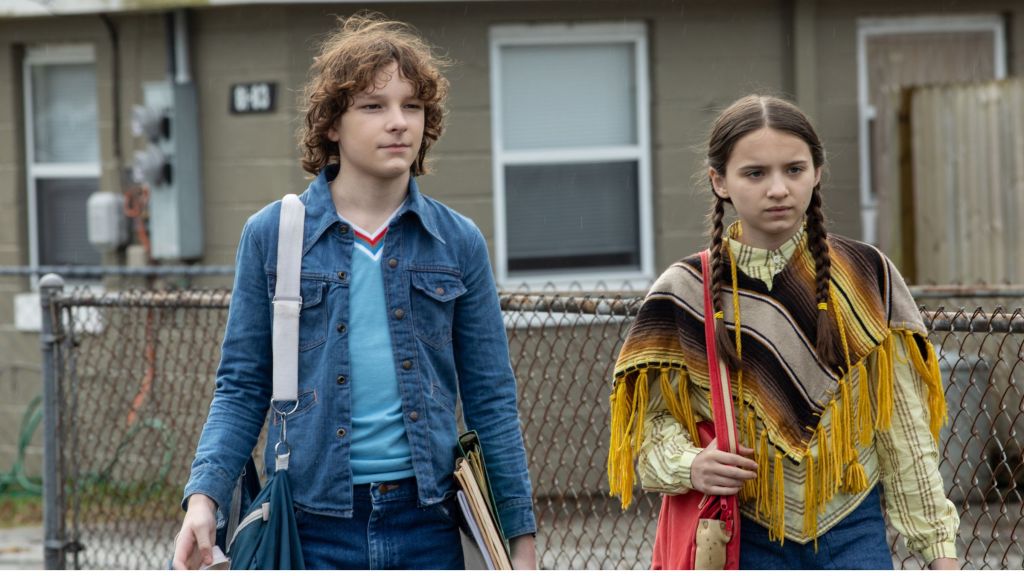
The Black Phone plot is set in 1978, North Denver. By then, the child abductor, nicknamed “The Grabber” by the press, had been snatching young boys off the street in his black van for years. After Finney’s friend Robin Arellano (Miguel Cazarez Mora), a tough kid who protected him from bullies, becomes the Grabber’s latest victim, the boy is left isolated and vulnerable. While walking home from school, a black van stops near him. The Grabber, disguised as a clumsy magician, gets out and drops his groceries. He engages Finney in a friendly conversation, luring him closer. He then releases a bundle of black balloons, and while Finney is distracted, he sprays him with a chemical, subduing him and throwing him into the back of the van. Finney wakes up in a soundproof basement, his only furnishing a dirty mattress and a disconnected black rotary phone on the wall. The Grabber, wearing a grotesque devil mask, informs him that the phone does not work.
While Finney is held captive, Gwen’s psychic dreams intensify. She sees visions of the Grabber and the black balloons, details she reports to Detectives Wright (E. Roger Mitchell) and Miller (Troy Rudeseal). Though they are initially dismissive, her knowledge of details not released to the public forces them to take her seriously, even as she endures her father’s horrific abuse for “lying.”
In the basement, the black phone begins to ring. On the other end are the spirits of the Grabber’s previous victims, starting with Bruce Yamada (Tristan Pravong), who tells Finney to dig a trench under a loose tile. Each subsequent ghost—Billy Showalter (Jacob Moran), Griffin Stagg (Banks Repeta), and Vance Hopper (Brady Hepner)—calls to give Finney another piece of a failed escape plan, which he attempts to reproduce with no success.
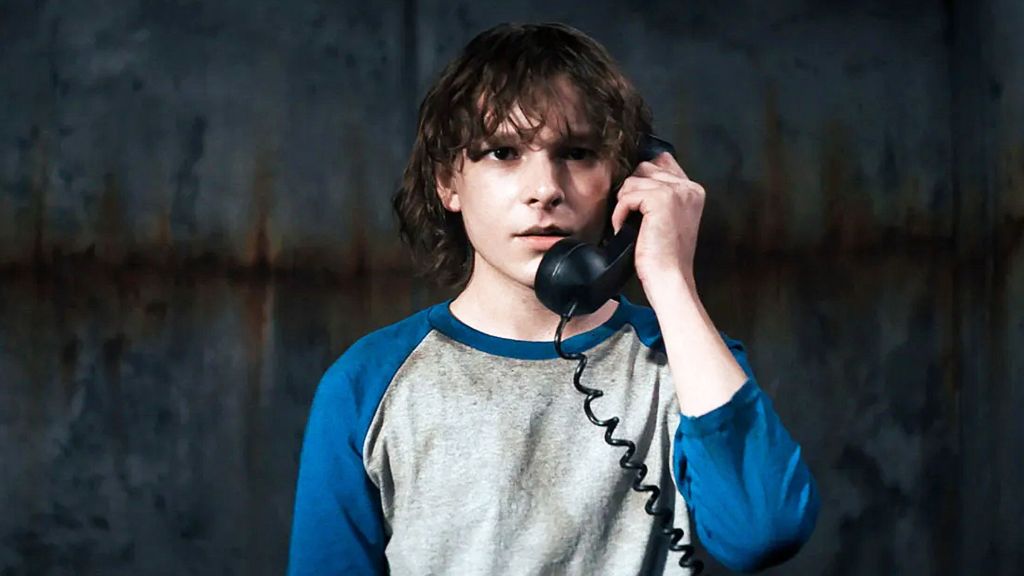
The Black Phone also features a crucial subplot involving the Grabber’s eccentric, cocaine-addicted brother, Max (James Ransone). Max is shown in his messy room, frantically mapping out the kidnappings on a pinboard, completely unaware that his own brother is the killer he is hunting. However, Max’s obsessive investigation ultimately leads him to the truth. After Gwen provides the police with a house number from one of her visions, the address is broadcast over the police scanner that Max is monitoring. He recognizes the number, and a look of dawning horror spreads across his face as he realizes it corresponds to the house he is currently in.
Max waits for his brother to leave, then goes down to the basement. He finds the terrified Finney and, in a hushed, horrified voice, asks him if his brother was the one who did this. Just as Finney confirms it, the Grabber returns home unexpectedly. He enters the basement and sees Max. There is a moment of chilling stillness before the Grabber, enraged at being discovered by his own brother, wordlessly picks up a fire axe and brutally strikes Max down, killing him.
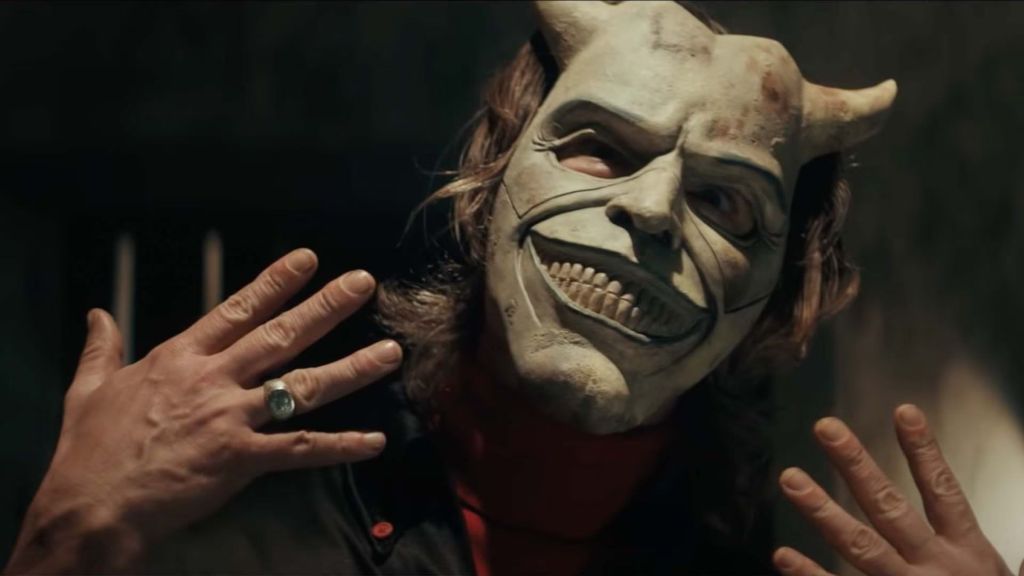
The murder of Max leaves Finney utterly alone and facing imminent death. The final ghost to call is Robin, who tells him to stop trying to escape and start fighting back. He coaches Finney on how to throw a punch and gives him the critical instruction: fill the phone’s heavy receiver with the dirt he dug up earlier, turning it into a formidable weapon. Finney then synthesizes every piece of information from the dead boys into a single, cohesive trap. As he prepares for the Grabber’s final assault, Gwen has a breakthrough vision, seeing the specific house where the Grabber buries his victims. She leads the police there, and they begin unearthing the bodies in the basement of the abandoned property.
At that exact moment, in the house directly across the street, the Grabber comes down to the basement to finally kill Finney. Finney uses the skills Robin taught him, striking the Grabber with the dirt-filled phone. As the dazed killer stumbles after him, Finney pulls the cord he laid across the floor, tripping the Grabber into the trench Bruce told him to dig. The Grabber’s leg lands on the metal window grate, which snaps his ankle. Finney seizes the advantage, brutally beating him before wrapping the phone cord around his neck. As he strangles his abductor, the black phone rings one last time, and Finney holds it to the Grabber’s ear so he can hear the taunting voices of the boys he murdered as he dies.
A victorious Finney then uses meat from the freezer to distract the Grabber’s dog and emerges from the house, where he is reunited with a crying Gwen. Their father arrives, sees them, and collapses in a sobbing, remorseful apology for his abuse. In the final scene, Finney returns to school, no longer a victim, but a confident survivor.
The Grabber Comes Back from the Grave
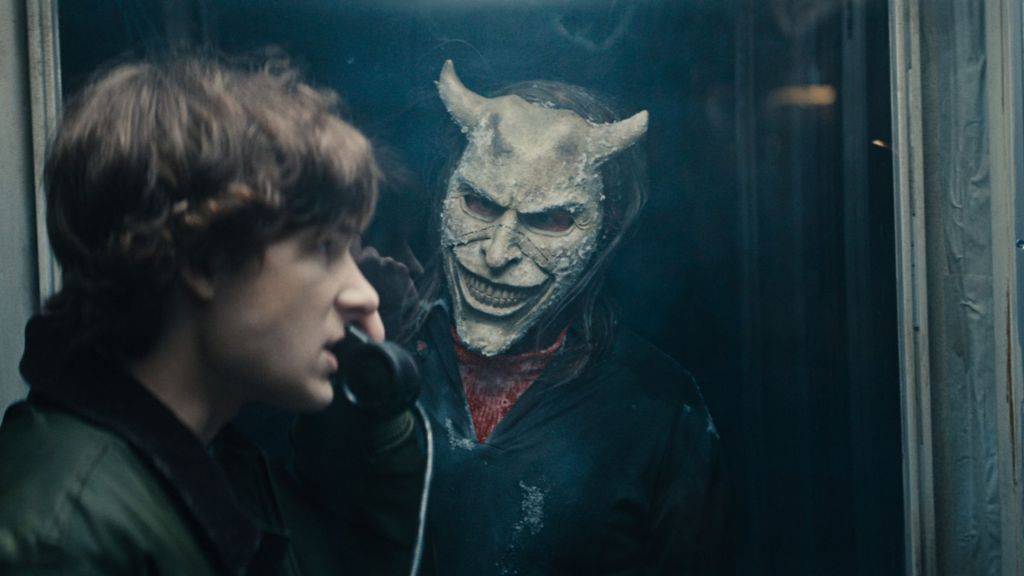
After Finney kills him, the Grabber’s spirit is sent to hell, where a person’s identity is stripped away, leaving only their sins. The Grabber, however, is so thoroughly defined by his evil that he retains his consciousness and identity even in damnation. The Grabber is consumed by a burning hatred for Finney, not just for ending his life but for forcing him to kill his own brother. This intense desire for revenge allows him to escape hell and return to the physical world as a malevolent entity.
The Grabber’s spirit is drawn back to Alpine Lake, the site of his very first murders. The location has become a powerful supernatural anchor for him because the spirits of his first three victims—Felix, Cal, and Spike—are still tethered there, their bodies never having been found. Their unresolved deaths create a wellspring of dark energy from which the Grabber feeds over the years, growing stronger. His increasing power begins to manifest as strange paranormal phenomena experienced by Mando and the other personnel who have begun restoring the camp, with the Grabber turning the property into his new haunted domain as he waits for his chance at revenge.
Finney and Gwen Go to Alpine Lake in The Black Phone 2

Four years after the Grabber’s death, in 1982, Gwen is now a pariah in school, ostracized due to the persistent rumors about her psychic powers. Despite this, she becomes romantically involved with Ernesto (Miguel Mora), the younger brother of Robin Arellano, the boy who helped Finney from beyond the grave. Ernesto is drawn to Gwen after learning she was the one who made the anonymous call that led police to Robin’s body.
Finney, meanwhile, has been unable to cope with his trauma. He has become addicted to weed and gets into constant fistfights with other teenagers who, having heard he killed a serial killer, try to test his toughness. He is angry, alone, and actively refuses to face his feelings. He is also still receiving mysterious phone calls from spirits seeking help, which he refuses to answer, confirming that he has partially inherited his mother’s psychic abilities.
Gwen begins to have intense, recurring dreams about the children murdered at Alpine Lake. These visions lead her back to the basement of the Grabber’s now-abandoned home. There, the black phone rings, and she answers a call that connects her across time to her own mother, Hope, back in 1957. This supernatural conversation allows Gwen to track down the location of Alpine Lake and discover that her mother once worked there. Then, she convinces a reluctant Finney and a supportive Ernesto to go with her to the camp to investigate the origins of her dreams. Unfortunately, shortly after they arrive, a severe snowstorm hits, trapping the trio at the remote youth camp with the permanent personnel, completely cut off from civilization and any outside help.
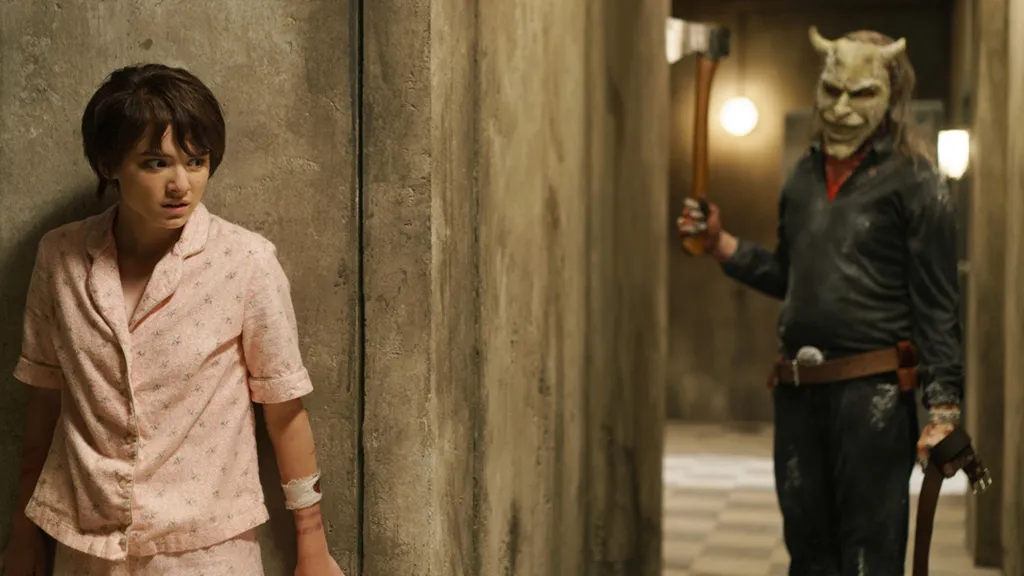
At Alpine Lake, the Grabber’s spirit uses the camp’s phone booth to communicate directly with Finney, spelling out his plan for revenge. He intends to kill Gwen, and her arrival at Alpine Lake gives him the tools he needs to fulfill his twisted desires. Because Gwen has such a strong connection to the spirit world, every time she falls asleep, she opens a doorway that the Grabber can use to interact with the physical world. This means each time she sleeps, she enters a helpless trance, and the Grabber is free to torment and harm her while the others can only watch, their only recourse a desperate attempt to wake her before he can do permanent damage.
After witnessing the spectral assault firsthand, Mando and the other camp workers are forced to accept the unbelievable truth of the teenagers’ story. They band together with Finney, Gwen, and Ernesto, realizing their only hope lies in finding the bodies of the Grabber’s first three victims, which are hidden somewhere on the property. By giving the lost boys a proper burial, they can release their tormented spirits from the limbo that has bound them to Alpine Lake. This can sever the Grabber’s primary power source.
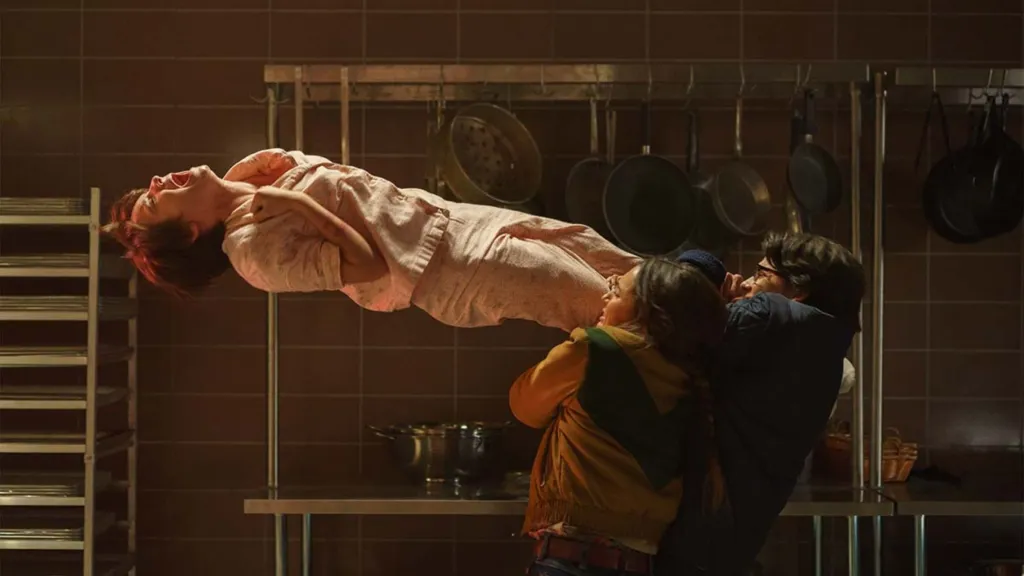
In the second half of The Black Phone 2, Gwen struggles to keep herself from falling asleep, but with each passing hour, the exhaustion becomes more overwhelming. Every time she succumbs, it becomes progressively harder for the others to wake her, and the Grabber becomes deadlier, his manifestations growing more tangible until he can attack everyone around him. During one of these attacks, the Grabber also revealed to Gwen the truth about her mother’s death, boasting that he was the one who followed Hope home and murdered her all those years ago.
The climax begins with the dramatic arrival of Terrence, who has borrowed a snowplow to battle the storm and reach his children. The family has a powerful moment of reconciliation, sharing their trauma and resolving to stand together against the Grabber. While everyone else frantically searches the frozen lake, Gwen takes control of her psychic abilities, challenging the Grabber in her dreams and using her astral projection to help guide the searchers. Thanks to that act of defiance, they succeed in finding the barrels containing the children’s bodies. In the final confrontation, Finney and Gwen together beat the Grabber’s spirit down, eventually pushing him into the hole in the frozen lake, where the newly released spirits of the children drag him back to hell.
Before they return home, Gwen receives one last call from her mother, Hope. From the afterlife, Hope thanks her daughter for helping the children, confirms that there is a life after death, and promises that they will all be together someday.
The Black Phone 2 is currently available in theaters.
How did you like The Black Phone 2? Did you enjoy how the sequel expands on the history of the first movie? Leave a comment below and join the conversation now in the ComicBook Forum!


